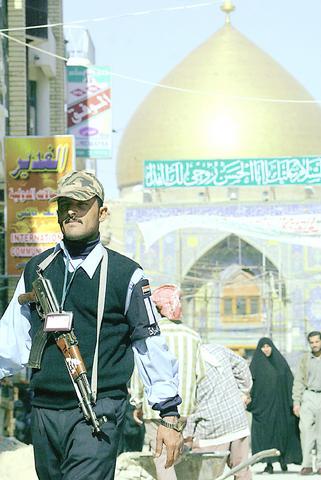The US military has learned from people close to Iraq's most powerful spiritual leader that accounts of an assassination attempt against him on Thursday were "a fabrication," a senior military official said on Friday.
Contradictory reports about a possible attack on the cleric, Grand Ayatollah Ali Husseini al-Sistani, in the southern holy city of Najaf continued to circulate throughout the country.
The US official said the military had no further information on how reports of an attack began. Early indications of an attack came from the spokesman for a prominent politician and from security guards for the ayatollah, the reclusive leader of Iraq's 15 million Shiites.

PHOTO: AFP
The official added, though, that the US military did not have "eyes on the ground to say definitely what happened."
The politician, Mowaffak al-Rubaie, an independent Shiite member of the Iraqi Governing Council, said on Friday that he could not confirm or deny reports of an assassination attempt. On Thursday night, his spokesman, Ali al-Shapoot, said that there had been an attack on the ayatollah, who is calling for immediate direct elections in Iraq, against the wishes of the administration of US President George W. Bush.
Some security officials for al-Sistani also told news organizations on Thursday night that there had been an attempt on the ayatollah's life. Radio Sawa, a regional station operated by the US government, reported earlier in the day that threats had been made against him, and that the cleric had moved to a safe location. The radio report was possibly the first public mention of a threat of some kind.
Rubaie, a neurologist, said on Friday that "an incident" had taken place on Thursday morning that involved al-Sistani. When Rubaie went to the cleric's small home in Najaf in the afternoon, he said, the ayatollah appeared "fit" and "not shaken."
"There was a heightened sense of security at his house," Rubaie said, adding that a small metal gate had been erected at the entrance to the narrow alleyway leading to the ayatollah's home.
The mouth of the alleyway, just blocks from the golden-domed Shrine of Ali, one of the holiest pilgrimage sites for Shiites, is usually watched by a couple of plainclothes guards. Al-Sistani, 73, rarely leaves his home. He occasionally receives worshipers, politicians and other religious leaders.
When asked how he had learned about the incident, Rubaie said he did not want to answer and abruptly cut off the interview.
There appeared to be some confusion on Friday among al-Sistani's representatives as to what had happened the previous day. Nooraddin Mousawi, the brother of the ayatollah's representative in Baghdad, said on Friday that the Baghdad office could not confirm or deny whether there had been an attack and was awaiting word from Najaf. Later, the office in Najaf released a statement saying that "there was absolutely no truth in these reports."
Hamid al-Kaffaf, the ayatollah's representative in Lebanon, told Al Jazeera, the Arab-language television network, that no one from the ayatollah's office had confirmed the assassination attempt. He said the ayatollah had increased security precautions in the last two weeks because his office had received "confused information" that there might be attacks on him.
He added that the people spreading rumors of the attack were trying to interfere with the imminent visit of a U.N. team expected to assess the feasibility of direct elections for a transitional national assembly. Al-Sistani has called for such elections by June 30.

A fire caused by a burst gas pipe yesterday spread to several homes and sent a fireball soaring into the sky outside Malaysia’s largest city, injuring more than 100 people. The towering inferno near a gas station in Putra Heights outside Kuala Lumpur was visible for kilometers and lasted for several hours. It happened during a public holiday as Muslims, who are the majority in Malaysia, celebrate the second day of Eid al-Fitr. National oil company Petronas said the fire started at one of its gas pipelines at 8:10am and the affected pipeline was later isolated. Disaster management officials said shutting the

US Vice President J.D. Vance on Friday accused Denmark of not having done enough to protect Greenland, when he visited the strategically placed and resource-rich Danish territory coveted by US President Donald Trump. Vance made his comment during a trip to the Pituffik Space Base in northwestern Greenland, a visit viewed by Copenhagen and Nuuk as a provocation. “Our message to Denmark is very simple: You have not done a good job by the people of Greenland,” Vance told a news conference. “You have under-invested in the people of Greenland, and you have under-invested in the security architecture of this

Japan unveiled a plan on Thursday to evacuate around 120,000 residents and tourists from its southern islets near Taiwan within six days in the event of an “emergency”. The plan was put together as “the security situation surrounding our nation grows severe” and with an “emergency” in mind, the government’s crisis management office said. Exactly what that emergency might be was left unspecified in the plan but it envisages the evacuation of around 120,000 people in five Japanese islets close to Taiwan. China claims Taiwan as part of its territory and has stepped up military pressure in recent years, including

UNREST: The authorities in Turkey arrested 13 Turkish journalists in five days, deported a BBC correspondent and on Thursday arrested a reporter from Sweden Waving flags and chanting slogans, many hundreds of thousands of anti-government demonstrators on Saturday rallied in Istanbul, Turkey, in defence of democracy after the arrest of Istanbul Mayor Ekrem Imamoglu which sparked Turkey’s worst street unrest in more than a decade. Under a cloudless blue sky, vast crowds gathered in Maltepe on the Asian side of Turkey’s biggest city on the eve of the Eid al-Fitr celebration which started yesterday, marking the end of Ramadan. Ozgur Ozel, chairman of the main opposition Republican People’s Party (CHP), which organized the rally, said there were 2.2 million people in the crowd, but